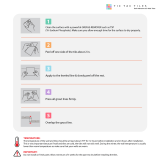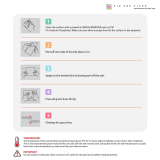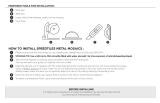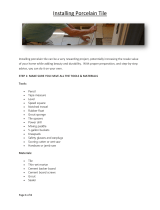
1. Wipe off excess grout with your Grout Float, held at a 45° angle, diagonally in relation to the grout joints. This will
prevent the float from digging the grout out of the joints. Be sure to remove as much as possible.
2. Wait 15 to 20 minutes after using the Grout Float to wipe the surface before cleaning.
3. Soak a Grouting Sponge with clean water, then wring thoroughly. It should be barely damp. Remove the
remaining grout by wiping diagonally in relation to the joint lines, and be sure to rinse the sponge often. DO NOT
OVERWET THE SPONGE. IT WILL DISCOLOR THE GROUT.
4. Repeat until the grout joints are smooth and level with the tiles.
5. The grout will dry to haze on the face of the installed tiles. Take a soft, dry cloth or cheesecloth and polish this haze
off the surface of the tiles.
6. Do not allow water near the grout for 48 hours.
1. Though not required, sealing your grout joints is highly recommended. It prevents liquid absorption and thus the
possibility of staining.
2. Follow the grout lines with a small paintbrush or cloth dipped into the grout sealer while wiping off any excess
that may spill onto the tiles. Make sure to wipe the tiles or you will be left with a haze that will take away from the
clear beauty of the Glass Subway Tiles.
3. Grout Sealer is not a permanent protector, and will
need to be reapplied. However, this length of time is
dictated by the amount of foot traffic/wear and tear
that the tile is subjected to. For example, a kitchen
backsplash may not need to be sealed at all, or if it is,
then only once. On the other hand, a floor tile in a
foyer may need sealer reapplied every 6 to 12
Use color-coordinating caulk in the grout joints where:
• There is a change of plane.
• Two walls or a wall and a floor meet
• Tile butts up next to a non-tile material i.e.
Adesilex P10 – A pure white, polymer-modified thin-set that has been specifically formulated for use with
glass tile installations. The true white color prevents the discoloration of the tiles by the thin-set.
Curing – The process of becoming hard or solid by cooling, drying, or crystallization; "the hardening of
concrete". 3”x6” glass subway tile requires roughly twice the curing time as glass mosaic tiles because of their
large surface area. We recommend 2 to 4 days curing time vs. the usual 1 to 2 days for MAPEI Adesilex P10.
Grout - A thin, coarse mortar poured into joints between tiles to fill them and consolidate the adjoining tiles
into a solid mass. Available in unsanded and sanded varieties. We recommend unsanded grout for glass tile
because of the small – less than 1/8” – grout joints and to prevent scratching of the tiles’ surface.
Notched Trowel – Designed to apply tile adhesive to vertical or horizontal surfaces quickly and evenly
without mess.
Open Time – Amount of time that thin-set will remain usable if left on the wall/floor i.e. MAPEI Adesilex P10
has an open time of 25 to 35 minutes.
Pot Life – Amount of time that mixed cement will remain usable if left in the bucket i.e. MAPEI Adesilex P10
has a pot life of 3 to 4 hours.
Slaking – The process that cements undergo as they interact with water that gives it strength. Allowing grout
or thin-set to sit and slake after mixing is very important in ensuring maximum adhesive strength.
Giorbello, Inc. provides this information as general
advice to benefit the customer, but in no way assumes
responsibility for the application of the information,
nor do we guarantee the results of its use.
Giorbello, Inc.
4660 New Design Rd., Suite I
Frederick, MD 21703
Website: www.Giorbello.com
E-mail: sales@giorbello.com
Toll Free: (877) 465-6008
Fax: (202) 536-5746








